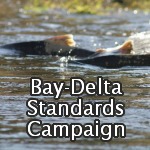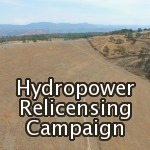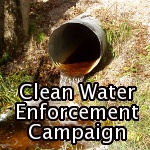The California Sportfishing Protection Alliance and allies AquAlliance and California Water Impact Network (CWIN), filed an objection on January 7, 2022 to yet another petition to weaken flow and salinity standards that protect the Sacramento-San Joaquin Delta. The objection urges California’s State Water Board to reject the Temporary Urgency Change Petition (TUCP) submitted by the U.S. Bureau of Reclamation and the California Department of Resources (DWR) for the time period from February 1 to April 30, 2022.
This is the second year in a row Reclamation and DWR are seeking a pass from responsibly and lawfully managing their operations. Stopping these waivers of environmental protections is critical to avoiding a repeat of 2021’s catastrophic fish kills and to protecting water quality for all citizens of California.
In June 2021, in spite of vigorous protests from CSPA and many others, the Board waived or weakened water quality requirements for Reclamation’s Central Valley Project (CVP) and DWR’s State Water Project (SWP). The Board’s disastrous decisions played a major role in a 2021 survival rate of less than 3% of juvenile winter-run salmon. Other native fish, including fall-run salmon, Delta smelt, and longfin smelt, also had another terrible year because of low flows and high water temperatures.
The stage was set when Reclamation and DWR over-delivered water to CVP and SWP contractors in 2020 and early 2021, instead of responsibly managing Delta operations and upstream reservoirs to protect public trust resources.
CSPA’s objection says the State Water Board should deny the TUCP for 2022. The Board must use its authorities under the reasonable use and public trust doctrines. The Board must set strict limits on SWP and CVP deliveries to all water contractors until Delta water quality standards are met and reservoir operations are managed to protect public trust resources. Each time the Board weakens standards, the impacts to fish get worse and the road to recovery becomes steeper. Fish populations that suffered under TUCP’s in 2021 have still not recovered from the TUCP’s in the previous drought of 2014-2015.
Battles on Many Fronts
Other recent actions that CSPA, CWIN and AquAlliance have taken to fight against the repetitive weakening of water quality and temperature standards include:
- CSPA and allies submitted comments to the State Water Board on January 7, 2022 on the Board’s Draft Order on Reconsideration for the 2021 TUCP on Delta operations and the 2021 Sacramento River Temperature Management Plan (TMP). The comments state that the Board’s actions in approving that TUCP and the TMP were unlawful and that the effects to fish were unreasonable and outrageous. The comments ask the Board to issue a new Order that acknowledges the unreasonable use of water and resulting unreasonable effects on fish and wildlife. It also asks the Board to set new procedures for:
- Determining the reasonable use of water in dry year sequences;
- Limiting water deliveries consistent with reasonable use; and
- Protecting public trust resources consistent with legal responsibilities.
- CSPA and allies also filed a Petition for Writ of Mandate asking a court to set aside the State Water Board’s June 1, 2021 approval of Reclamation and DWR’s TUCP for Delta operations.
- In addition, CSPA and allies filed a Petition for Writ of Mandate asking a court to set aside the State Water Board’s approval on June 10, 2021 of Reclamation’s Sacramento River Temperature Management Plan for Water Year 2021.
The merry-go-round of the State Water Board’s serial waivers of water quality and temperature standards must stop. It is imperative for the Board to responsibly manage California’s water during drought, a historically common occurrence.









